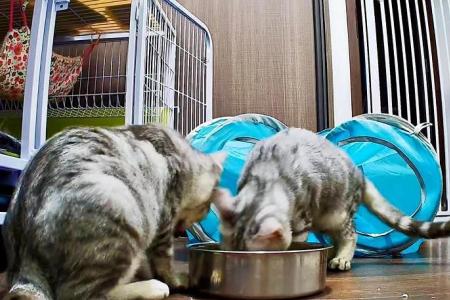New cat licensing rules will weed out backyard breeders
The four-month-old kittens were suspected of having cat cerebellar hypoplasia, a condition in which the brain stops growing and remains in an immature state. It is caused by a viral infection passed on from the mother cat.
They were wobbly and struggled with balance and coordination.
The American shorthair kittens were rescued from an unlicensed breeder and are now being cared for by a volunteer.
Founder of Animal & Avian Veterinary Clinic Kenneth Tong said backyard or unlicensed breeders – often carrying out breeding in their own homes – tend not to abide by standards of responsible breeding or animal welfare. The dam, or mother cat, is often made to produce litters “whenever (she) comes into oestrus (in heat), and for the sole purpose of making financial gains”, said Dr Tong.
They are often not given sufficient rest and recovery after delivery, he said.
But new registration rules for cat ownership when they come into force in September could reduce the amount of illegal breeding.
Under the new Cat Management Framework, which seeks to improve the welfare of feline pets, a maximum of two cats will be allowed in each Housing Board flat, and up to three cats in a private residence, with owners required to license and microchip all their pet cats.
Ms Jessica Kwok, group director for the Animal and Veterinary Service (AVS), said this could weed out illegal breeders.
“This is because either they own or they do not own all the cats. If they own the cats, the cats should be kept indoors and if they don’t own them, then the cats would be sterilised under the TNR (trap-neuter-release) programme,” she said.
Dr Tong said vets will have to report suspected unlicensed breeders to the authorities, or the Society for the Prevention of Cruelty to Animals (SPCA) and Animal Concerns Research and Education Society (Acres).
Other concerns of unlicensed breeding are inbreeding and lack of care for the litter, including getting the animals vaccinated. Kittens that cannot be sold may be euthanised or left to fend for themselves.
“Illegal breeders do not have sound breeding programmes and selection to prevent inbreeding, as they do not have in-depth knowledge of safe breeding. In many cases, recessive traits are passed on, resulting in deformities or health issues,” said Dr Tong.
Animals suffering severe birth defects may have to be put down.
“If the birth defect is so severe that the quality of life is greatly affected, for example, a severe cleft palate where food gets aspirated into the lungs leading to pneumonia, or a condition where death is likely within a few days, then euthanasia would be considered to relieve the suffering of both the newborn and the owners,” he said.
Homes may be found for the other animals.
Currently, there are three licensed cat breeders in Singapore. The oldest is ChubbyBuddy, a British Shorthair cattery located in Singapore and registered with the Cat Fanciers Association (CFA) and The International Cat Association (TICA). The other two, which AVS did not name, received their licences recently.
Though breeding and selling animals without a licence is illegal in Singapore, there is demand for pets that cost a fraction of what they would from a licensed breeder.
Kittens, puppies and kits (baby rabbits) from backyard breeders are listed every day on social media such as Facebook, classified sites like Gumtree and forums like Telegram for $200 to $2,500; in comparison to between $800 and $9,000 from a legal breeder.
Rescuers said these illegal breeders tend to delete their posts in one to three days once they garner enough interest.
As unlicensed breeding is usually “hidden from public view”, premises are not inspected to ensure animals have hygienic housing, appropriate diets and adequate husbandry and veterinary care.
Even potential buyers are not given access.
A seasoned rescuer, who wanted to be known only as Ms Wati, said: “They would meet potential buyers of the kittens at different locations to ensure their premises remain hidden; but they would never meet rescuers.”
One potential buyer who managed to visit a backyard breeder a few years ago was drama tutor Desmond Sim, 62.
Mr Sim had wanted to buy a birman cat because he liked its long silky coat and deep blue eyes. He saw an advertisement online and got in touch with the breeder.
“I asked to see the kittens and when I got there, the condition of the place was rather appalling. There were cats all over, and they were not the breed I had wanted. They were allowed to wander and were almost feral. The kittens that were presented did not like to be picked up and had their claws out,” said Mr Sim, who left without buying a kitten.
Other rescuers said it can be hard to differentiate between an illegal home breeder and a cat hoarder.
“The living conditions for the cats would be poor. For some, there would be cats kept in cages in the living room and bedrooms, and the place would smell of cat urine and faeces. Others would have kittens darting from behind cupboards,” said a rescuer, who declined to be named for fear breeders would not “hand over faulty kittens” that are not in good health or condition.
In January 2022, 29 cats were seized by AVS officers from an illegal cat breeder after a tip-off from a member of the public regarding the unlicensed breeding and selling of cats.
The National Parks Board said that under the Animals and Birds Act, those found guilty of keeping animals in captivity for sale without a licence may be fined up to $5,000, jailed for up to six months, or both.
The Act also stipulates that the penalty for using premises as a farm without a licence is a fine of up to $10,000, up to one year’s imprisonment or both.
Get The New Paper on your phone with the free TNP app. Download from the Apple App Store or Google Play Store now


